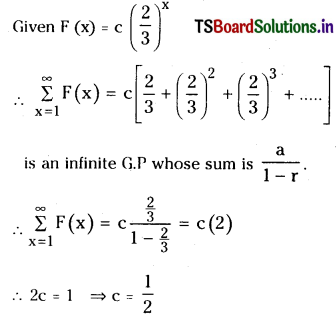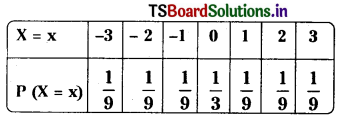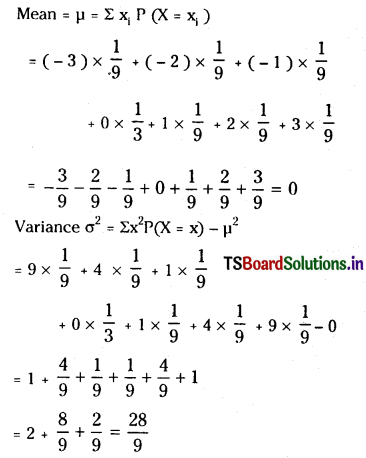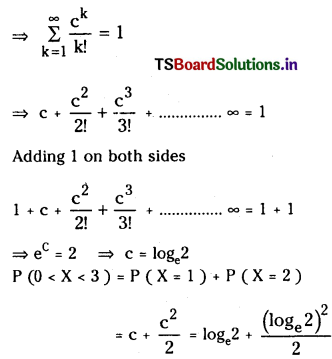Students must practice this TS Intermediate Maths 2A Solutions Chapter 10 Random Variables and Probability Distributions Ex 10(a) to find a better approach to solving the problems.
TS Inter 2nd Year Maths 2A Solutions Chapter 10 Random Variables and Probability Distributions Ex 10(a)
I.
Question 1.
A p.d.f of a discrete random variable h zero except at the point to x = 0, 1, 2. At these points it has the value P(0) = 3c3 P(1)= 4c – 10c2, P(2)= 5c – 1 for same c > 0. Find the value of c.
Solution:
Given P(0) = 3c3,
P(1) = 4c – 10c2,
P(2) = 5c – 1
we have \(\sum_{i=0,1,2}\) P(i) = 1
⇒ P(0) + P(1) + P(2) = 1
⇒ 3c3 + 4c – 10c2 + 5c – 1 = 1
⇒ 3c3 – 10c2 + 9c – 2 = 0
c = 1 satisfy the equation by inspection and for c = 1, we have
P(0) = 3,
P(1) = 4 – 10 = 6,
P(2) = 4
Hence c = 1 does not satisfy 0 ≤ P (E) ≤ 1.
So we try for other solutions by synthetic division method.

∴ 3c2 – 7c + 2 = 0
⇒ 3c2 – Gc – c . 2 0
⇒ 3c (c – 2) – 1 (c – 2 )= 0
(3c – 1) (c – 2 ) = 0
c – 2 = 0
⇒ c = 2 is not admissible;
∴ c = \(\frac{1}{3}\) suit the solutions P (0), P (1) and P (2)
∴ c = \(\frac{1}{3}\).
![]()
Question 2.
Find the constant c, so that F(x)= c\(\frac{2}{3}\), x = 1, 2, 3, …………… is the p.d.f. of a discrete random variable X.
Solution:
Since F (x) is the p.d.f. oF discrete random variable x.
we have \(\sum_{x=1}^{\infty}\) F(x) = 1

Question 3.

is the probability distribution of a random variable X. Find the value of k and the variance of X.
Solution:
Sum of the probability = 1
⇒ 0.1 + k + 0.2 + 2k + 0.3 + k = 1
⇒ 4k + 0.6 = 1
⇒ 4k = 0.4
⇒ k = 0.1

Mean = Σxi P (X = xi)
= (- 2 ) × 0.1 + (- 1 ) × 0.1 + 0 × 0.2 + 1 × 0.2 + 2 × 0.3 + 3 × 0.1 = 0.8
Variance σ2 = Σx2 P (X = x ) – μ2
= ( – 2 )2 × 0.1 + ( – 1)2 × 0.1 + 02 × 0.2 + 12 × 0.2 + 22 × 0.3 + 32 × 0.1 – ( 0.8 )2 = 2.16.
![]()
Question 4.

is the probability distribution of a random variable X. Find the value of k and the variance of X.
Solution:

Question 5.
A random variable X has the following probability distribution.

Find i) k ii) the mean and iii) P(0 < X < 5).
Solution:
Sum of the probability = 1
⇒ 0 + k + 2k + 2k + 3k + k2 + 2k2 + 7k2 + k = 1
⇒ 10k2 + 9k – 1 = 0
⇒ 10k2+ 10k – k – 1 = 0
⇒ 10k(k + 1) -1 (k + 1) = 0
⇒ (10k – 1) (k + 1) = 0
⇒ k = \(\frac{1}{10}\); (k = – 1 is not admissible since probability is non-negative).
![]()
II.
Question 1.
The range of a random variable X Is (0, 1, 2). Given that P (X = 0) = 3c3,
P (X = 1) = 4c – 10c2, P (X = 2) = 5c – 1.
Find (i) the value of c
ii) P(X < 1), P (1 < X ≤ 2) and P (0 < X ≤ 3).
Solution:
i) Sum of the probabilities = 1
⇒ P( X = 0) + P (X = 1) + P (X = 2) = 1
⇒ 3c3 + 4c – 10c2 + 5c – 1 = 1
⇒ 3c3 – 10c2 + 9c – 2 = 0
⇒ (3c – 1) (c – 1) (c – 2) = 0
⇒ c = \(\frac{1}{3}\) [∵ c ≠ 1, 2].
ii) P(X < 1) = P(X = 0)
= 3c3
= 3 × (\(\frac{1}{27}\)) = \(\frac{1}{9}\)
P(1 < X ≤ 2) = P(X = 2)
= 5c – 1
= 5(\(\frac{1}{27}\)) – 1
= \(\frac{2}{3}\).
P(0 < X ≤ 3) = P(X = 1) + P(X = 2)
= 4c – 10c2 + 5c – 1
= – 10c2 + 9c – 1
= \(-\frac{10}{9}+\frac{9}{3}-1=\frac{8}{9}\).
Question 2.
The range of a random variable X is {1, 2, 3, …………} and P (X = k) = \(\frac{c^{\mathbf{k}}}{\mathbf{k} !}\). Find the value of c and P (0 < X < 3).
Solution:
∵ Σ P(X = k) = 1
